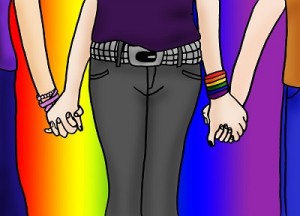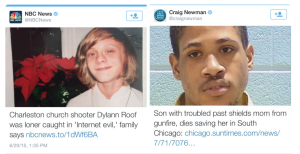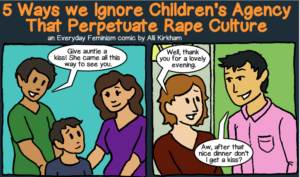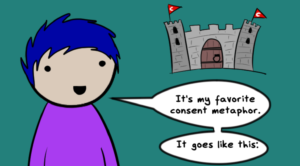Originally published on the Huffington Post and republished here with the author’s permission.

Cheerful person in a yellow shirt shrugs their arms in confusion or in question with a group of people in blue shirts behind them.
Last week an article was published in the September issue of the The Atlantic titled “The Coddling of the American Mind.”
The goal of the article was to show that college students (aka Millennials) are increasingly rigid in their language, especially those words or phrases involving race, gender, religion, or any other target status. This is commonly referred to as political correctness.
The authors’ thesis was that “college students are increasingly demanding protection from words and ideas they don’t like.” They go on to conclude that this political correctness is unhealthy and “disastrous” for education and mental health.
The photograph that accompanied the article was of a small child, age three or four, sitting at a desk with the words “college” written across his sweatshirt. The Atlantic was sending a clear message: College students are immature babies.
I read this article with disbelief. It reminded me of the language debates of the sixties and seventies when college students were at the front-line of desegregation, choosing to use words that appeared rigid in their day, but in historic terms, were at the vanguard of contemporary thought about race.
The word “African-American” or “LGBTQ” may have sounded long and verbose, and were discounted by the established mainstream press, but it set the standard for years to come. In the past, as in today, college students, in their focused choice of words and phrases, set the bar for others to follow. And follow we will.
Perhaps you agree with The Atlantic and think that college students are just too uptight and politically correct. Most of The Atlantic readers are liberal White Americans who are doing their part to make the world a better place for all creeds and colors.
Like many 40-something White liberals, I too assume I’m relatively open-minded and conscious of my white privilege. “I’m not a racist,” I say to myself, when images of police brutality flash on the screen. “I’m not like those white people.”
Or am I?
Like me, you probably voted for Barack Obama, were outraged by the verdicts in the Trayvon Martin, Michael Brown, and Eric Garner cases. You even work hard to check your white privilege at the door when going to a #blacklivesmatter protest march.
We are one of the millions of white people willing to make a change for the betterment of our country. We actually live by the words of our Declaration of Independence, that “all men are created equal.”
At times, though, we feel a distance from our black and Latino friends; a noticeable energetic gulf that separates us from a deeper connection with them. We want to be closer to people of color. Yet somehow, some way, we sense a wall between us. We wonder: Is it me or them?
Maybe years of racism have made it hard for people of color to trust White folks – even Atlantic magazine liberals like you and me.
Or maybe we’re saying or doing something racially insensitive – perpetuating racism and white privilege. And we don’t even know it.
Maybe the millennials know best.
Microinvalidations
Microinvalidations are momentary acts that serve to invalidate the very people of color we care about. These unconscious interactions perpetuate the hopelessness many African-Americans, Latinos, Native Americans, and other people of color, feel in this country.
Many of you may stop reading now, thinking, “Here we go with the political correctness.” You say to yourself: “I’m not perpetuating racism, and I’m certainly not invalidating people of color. Donald Trump may be, but not me.”
That’s what I used to think. But, right there, you’re committing a microinvalidation. It’s called Denial.
Racism just won’t die, because its roots are deep.
Somewhere down where we don’t like to go, is a place where racism lives. It’s automatic and hidden. Binding and resistant to change. No matter how well-meaning we are, no matter how open-minded. Like the “root kit” on a computer, racism is hidden and operating without our knowledge.
Paul Pendler, Psy.D., of the Department of Psychiatry & Behavioral Sciences, Feinberg School of Medicine, Northwestern University Medical School and Phillip Beverly, Ph.D., Department of History, Philosophy, and Political Science at Chicago State University, wrote The Racism Root Kit: Understanding the Insidiousness of White Privilege.
The paper suggests that White people defer to an internal “root kit,” or set of ingrained responses, to cover our racial biases and shut down those who intend to make us face them. Just like The Atlantic magazine did to today’s college students.
Beverly and Pendler reference the work of Derald Wing Sue, PhD:
“Sue and his colleagues delineated three forms of microaggressions: microassault, microinsult, and microinvalidation. Microassaults are explicit racial slurs with the intention to hurt an intended victim through name-calling. Microinsults are subtle communications that convey rudeness and attempt to demean one’s racial identity. Finally, microinvalidations are comments that intend to exclude or nullify the feelings or experiences of persons of color.”
Too often these microaggressions, in particular microinvalidations, go unchallenged by people of color, due to the inherent power imbalance felt with White people. Racism is experienced, but not acknowledged.
When a person of color does take issue with those types of encounters, many well-meaning White liberals, myself included, can become overly apologetic, defensive, or even offended when confronted with the subtle indignity of our words or actions.
These knee-jerk defenses are actually how we as white liberals end up perpetuating racism. Thus, true self-awareness and deeper relationships with people of color never really happen.
This is what young people know instinctively. And what older white Liberals like you and me have a hard time understanding.
There’s a problem when we champion change, then hide from it when it really counts. Like it or not, White superiority is well defended and protected. It may be unintentional. It’s likely unconscious. Without more introspection and sincere interaction, the racism train keeps rolling.
Right now, you might feel angry and misjudged.
Maybe you’re a white liberal shaking your head, feeling slighted and angered by the lack of acknowledgment, regarding your efforts and accomplishments concerning racial sensitivity. After all, white liberals are the white folks who really get it. Right?
Wrong. This is, in fact, another microinvalidation. Beverly and Pendler call that particular microaggression “attack by racial resume.” We say, “Look at all the work I’ve done on behalf of people of color! I’m one of the good ones!”
If you’re still with me, and aren’t in total denial, consider these 10 ways white liberals engage in subtle racism, as offered in Pendler and Beverly’s Racism Rootkit.
1. Denial
Denying we could ever have racist thoughts, or that we reap the benefits as a member of the majority race, is a common defense of liberal White Americans. By denying the existence of our racist thoughts, we negate the depth of the racial divide.
“But I don’t even see color.”
As if by being “colorblind” we can resolve the racial pain people of color live out. Pendler and Beverly note, “An inability to be open to the possibility that the experience of the other could be valid is a consistent element of white supremacy.”
2. Shame and Hurt
When focus remains on the White person, and our emotional wounds, this is classic deflection and redirection.
“I’m so embarrassed I said that!”
This common phrase can be heard when something hurtful may have been said to a person of color. The truly injured party, however, remains unrecognized. By having the courage to confront a racial slight, a person of color is made to feel that they have misread us, or hurt our feelings.
We might also say: “I’m hurt that you think of me like that.” This further draws the attention back to us, and away from the real issue of pain felt by the person of color. When sympathy transfers to the white person, no awareness or learning occurs. No trust is built.
Try this next time you’re confronted with something insensitive: “I hear how my words or actions hurt you. Thank you for pointing that out to me.”
3. Checking Out and Ignorance
Shutting down or going blank is a common symptom of white fragility. Racism retains a foothold when white people reach a threshold in their racial sensitivity and invoke their white privilege to “check out,” and go silent, instead of sticking out the racial awareness process.
The other side of that coin is simply to choose ignorance.
“I had no idea about that!”
You’re feeling of being clueless leads to detachment. The responsibility to look inward is traded for making the person of color “assume the responsibility for bringing cultural and racial awareness to the surface.”
4. Masochism
When a white liberal’s guilt runs amuck, it may become a deep-seated need to take his or her racial lumps. Taking the neighborhood’s homeless black man in for a meal may help him, but does the giving come from a place of joy or guilt? What happens when he steals from you?
In retrospect, was your original act helpful or masochistic? Perhaps a $10 donation on the street might have served both of you better. White liberals, who unconsciously seek self-punishment for historical oppression, appear racially sensitive.
But they actually perpetuate racism by simply becoming “a receptacle for potential and actual abuse,” instead of examining their racially-biased behavior.
5. Apology and Faux Compassion
“I’m so sorry. I feel your pain.”
This is an example of a deflective technique many white people use to draw attention away from an initial, biased encounter. Again, not taking time to look inward stops short of sincere sensitivity.
Pendler and Beverly comment, “While displaying empathy toward another is often associated with an act of connection, the speed with which white people rush to express sympathy and understanding, at the expense of acknowledging their participation in racist behavior and ideology, discourages a deep relational connection in the moment.”
Basically, don’t apologize first. Try this instead: “I’m here to listen and learn.”
6. Defensiveness
“But you know me. I’m not a racist!
This response to confrontation happens all the time. A white person reminds black people that they personally owned no slaves, their relative marched with Dr. King, and they were into NWA before they got big – so obviously they’re in the clear regarding racism.
Defensiveness is intended to end the discussion, absolve them, and quiet accusations surrounding white privilege. You really just built a brick wall.
7. The Pain Game
“You’re not the only ones. My family was wiped out in the Holocaust.”
These microinvalidations are meant “to silence, diminish and denigrate the experience of the person of color.” Comparisons made to other races or cultural groups are insensitive. Creating a “contest of pain” keeps racist language alive, highlights deep insensitivity, and is yet another deflection from the initial microinvalidation that, if explored, could be enlightening.
I notice that White American Jews, myself included, use this microinvalidation often, comparing slavery and 300 years of oppression to the Holocaust. This is not the bridge to connection as intended, but rather brings the focus back to the White person, further invalidating the person of color.
8. Racial Resume
Many White liberals keep a mental, multicultural resume to be submitted as evidence of racial tolerance and support
“I voted for Obama!”
However, talking about how we have Black friends, coached an inner-city basketball team, or live in a racially-mixed neighborhood does not excuse us from internal racial insensitivity. This microinvalidation denies the person of color their feelings because they then have to argue with our resumes.
9. White Guilt
According to The Racism Root Kit: Understanding the Insidiousness of White Privilege, a person experiencing white guilt will attempt “to provide comfort as if to ‘make up’ for the indignation expressed by the person of color.”
“I feel terrible about all the police brutality against black people.”
We may want to “do the right thing,” but because no real change or self-examination is engaged, no awareness takes place.
10. Intellectualization
As a defensive tool, a white person might bring up societal exceptions, and success stories to negate the experience of someone who challenges their racial biases.
“But we have a black president!”
These examples are held up as reasons why we can dismiss the experience of the person of color: “…because logically the person of color should not be having the experience they are having.”
***
If you’re still with me and not asleep, checked out, totally confused, overwhelmed, or defensive, then you’re probably an open-minded white person.
If we as white liberals want to walk the walk, we have to do more. We have to acknowledge the uncomfortable value of political correctness as a change agent.
If we truly want a different world, let’s ask ourselves:
- Is it possible that I might unintentionally say something that might be perceived as invalidating by people of color?
- Can I take an honest inventory of my unintentional microinvalidations, if the person of color confronts me? What is my go-to defense? Denial? Hurt? Faux Compassion, Pain Game, Intellectualization?
- Can I engage with people of color without deferring to internal defenses, especially when my unintended microinvalidations and unconscious sense of superiority are confronted?
- Can I be open to the impact of my words, expressing interest and caring how my actions have been perceived?
- Can I simply say: “I wasn’t aware my words or actions hurt you. Tell me more so I can learn?”
These are tough questions. It hurts to know that my words might have invalidated another, and that I may have contributed subtly to racism. For a 40-something White liberal, I’m acknowledging I have more to learn.
Millennials seem know that in the smallest of words is where the greatest of pain lies.
Only through continued growth, awareness, and acknowledgment that words matter can something as ugly as racism be overcome.
[do_widget id=’text-101′]
George Sachs PsyD is clinical child psychologist and founder of the Sachs Center for ADD/ADHD and Aspergers in Manhattan. He specializes in the testing and holistic alternative treatment of ADD/ADHD in children, teens and adults, utilizing social skills groups and Neurofeedback for ADHD. Follow George Sachs, Psy.D. on Twitter @drgeorgesachs and on his personal website, www.sachscenter.com.
Search our 3000+ articles!
Read our articles about:
Our online racial justice training
Used by hundreds of universities, non-profits, and businesses.
Click to learn more




















